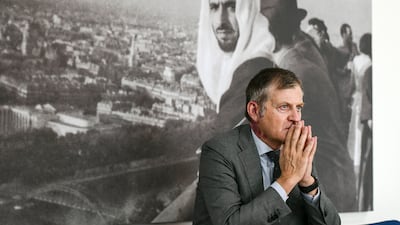New energy suppliers, faster adoption of renewables and lower power consumption should help the EU get through another winter “without any major disruptions”, a bloc official has said.
Europe, which is looking to reduce its reliance on Russian natural gas exports, has boosted imports of liquefied natural gas (LNG) from the US and the Middle East.
“We have taken the decision to make sure that we go into the winter with gas reserves filled up [to] at least 80 per cent. We managed that last year and we want to do the same thing this year,” Andrea Fontana, the EU ambassador to the UAE, told The National in an interview last week.
Russia now makes up for less than 10 per cent of the EU’s overall natural gas imports, and it will continue to be replaced by other sources, Mr Fontana said.
“Meanwhile, the nuclear power plants that were undergoing maintenance have restarted their operations and gas reserves are monitored and more prioritised … I think that we are going to be fine,” said Mr Fontana.
“But, there can always be surprises.”
European gas demand was lower due to an unusually warm winter and as efforts aimed at reducing consumption reaped rewards. The European natural gas benchmark was last trading at about €53 per megawatt hour on Thursday after surging to €343 in August last year.
However, a rebound in LNG imports from China and a complete halt in Russian supply could result in the region falling short by about 27 billion cubic metres of gas in 2023, the International Energy Agency said in a report last year.
Watch: Ukrainian President calls for more arms more quickly at Davos
Following an embargo on Russian crude exports in December, the EU recently banned imports of refined products from the country. The bloc, along with the G7, also imposed price caps on Russian shipments of diesel, naphtha and fuel oil.
“We are sanctioning Russian energy products because we believe that this is the main way Russia is funding this horrible war,” said Mr Fontana.
“We did not manage to completely isolate [Russia], but we see that their capacity to innovate [and] grow in new markets and new products has been severely depleted.
“The sanctions are having an effect, but perhaps not as big as we wanted, and the main reason is that not all countries are following our lead.”
Russian oil exports in January rose by 300,000 bpd from a month ago to 8.2 million bpd, the IEA said in its monthly oil market report on Wednesday.
The country’s export revenue stood at $13 billion, slightly higher than in December, but down 36 per cent from the same period a year ago, the agency said.
Meanwhile, the EU is moving ahead with its renewable energy plans.
This month, the bloc launched the Green Deal Industrial Plan to boost the “competitiveness” of Europe's net-zero industry and support the fast transition to climate neutrality.
The programme, which is a part of the European Green Deal, comes partly in response to the US Inflation Reduction Act, which includes hundreds of billions in federal subsidies for green technology.
The American legislation has been met with some opposition in the EU amid concerns that it would put European companies at an unfair disadvantage.
“We have been calling on the US to do more in the [clean energy] area, so it’s good that these steps were taken … where we see a problem within the IRA is the fact that it links the financial incentives to certain geographies and … that is not good for competition,” said Mr Fontana.
Investment in low-carbon projects is expected to increase by $60 billion this year, 10 per cent higher than 2022, led by wind and a “significant” rise in funding for hydrogen and carbon capture, according to Rystad Energy, an energy consultancy.
To ward off a near-term gas shortage, European countries have signed multiple energy agreements with Gulf exporters.
In November, QatarEnergy signed two sales and purchase agreements with ConocoPhillips to deliver up to 2 million tonnes per annum of LNG to Germany.
On Wednesday, Adnoc and German power company RWE announced the delivery of the first shipment of LNG from the UAE to Germany.
There is “no negotiation” taking place with players in the region currently, but talks will start soon with the UAE about a possible green hydrogen partnership, Mr Fotana said.
“We are working with our Emirati partners to identify areas where … a partnership could arise and I think that the most promising one for the moment is green hydrogen,” he said.





























































